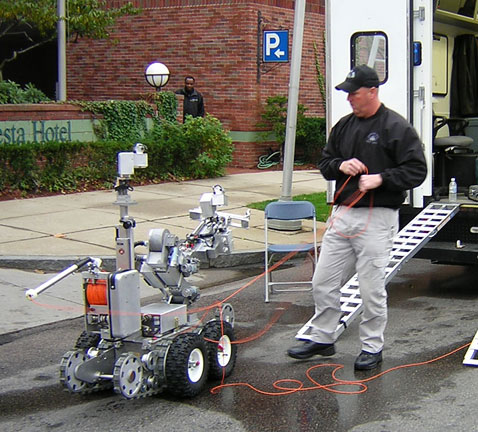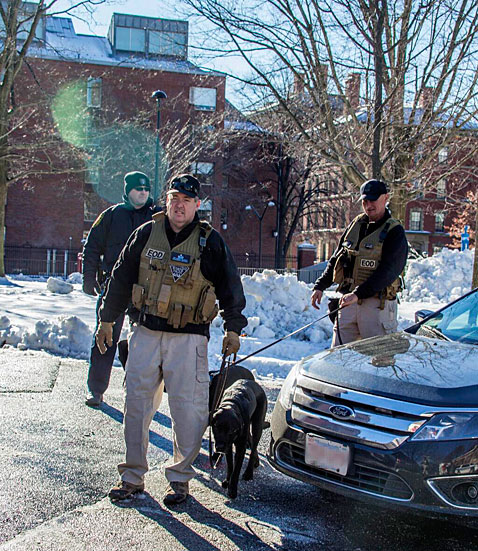Marathon anniversary speeds funding request for full-time city bomb squad (update)
![]()

Cambridge police personnel roll out a remote control vehicle at a 2005 bomb threat near the Cambridgeside mall. (Photo: Douglas Heulitt)
Just hours after a false bomb threat forced the evacuation of four Harvard buildings and locked down two Cambridge public schools Monday, the City Council shifted nearly a half-million dollars from the city’s free cash to create a full-time Cambridge Police bomb squad and beef up an existing Special Response Team and Tactical Patrol Force.
The new Explosive Ordinance Unit is to have five bomb dogs and five members, including four patrol officers and a sergeant, adding to a force of more than 310 officers and civilians. Spending on public safety accounts for $113.5 million of the city’s annual budget for fiscal year 2014, or 22.4 percent.
That fact that the six-hour incident at Harvard brought in a typically overwhelming demonstration of mutual aid that officials said included the Department of Homeland Security and so-called Department of Homeland Investigations, federal Bureau of Alcohol, Tobacco and Firearms, FBI and police forces from Harvard, Boston and the MBTA in addition to Cambridge officers and firefighters, councillor Minka vanBeuzekom had a reasonable question: Why now?
“We seem to have managed well with mutual aid,” said vanBeuzekom, at her last meeting as a councillor. “I’m not sure why we need to have this established right now … . I think we should wait for the normal budget cycling.”
Request from Boston
Police Commissioner Robert C. Haas said the $485,000 budget request would have been made eventually, but the timeline was reset by Boston looking to the one-year anniversary of the bombs that went off at the Boston Marathon on April 15, killing three people and apparently leading to a fatal attack on an MIT police officer, carjacking, chase, shootout and manhunt that ended with one Cambridge resident dead and another arrested and facing trial. The anniversary comes weeks before the council wraps up its work with the city’s budget.
“That’s why it’s speeded up. I didn’t expect to see these dogs for another 18 months. But because of what took place this past April, they wanted to step up the program and have these assets in place by the next marathon,” Haas said.
“If we don’t take advantage of the grant funding, we’re going to leave $1.1 million on the table and we won’t have that money to start the program,” he said, referring to money to buy and train bomb dogs and bring in vehicles and equipment for the teams.
Work has begun

State Police troopers help investigate bomb threats to buildings at Harvard on Monday. Cambridge will soon have its own five bomb dogs. (Photo: Massachusetts State Police)
In response to a question from vanBeuzekom, Haas confirmed that the grant money wouldn’t be repeated and that ongoing costs of the new personnel, animals and equipment were to be “absorbed” by the city and police force in the budget presented to the council for fiscal year 2015.
Stephen Ahern, a deputy superintendent with the force, said the shifting of personnel had already started. The five bomb squad members were coming from within the force, which would hire five officers to replace them. The search for dogs has also begun.
It wasn’t unusual for police spending to begin ahead of an actual council vote for allocation, said councillor Craig Kelley, chairman of its Public Safety Committee, on Tuesday. He and retiring Mayor Henrietta Davis suggested officials at the police and finance departments could better explain what would happen if the council turned down a request for money that was already being spent.
The council has a history of being unable to rein in the police and city manager on policies members disagree with. Former city manager Robert W. Healy, before retiring last summer, claimed powers as “chief conservator of peace within the city” as laid out in its Plan E charter.
Spending hasn’t begun in this case, Budget Director Jeana Franconi said Wednesday.
“I think there was some confusion in the response,” Franconi said. “I have a listing of the items they would like to purchase, and in my information they have not gone ahead and purchased them.” The grant has also not been appropriated.
As to whether spending ever comes ahead of funding approval, “That should not be happening,” Franconi said.
If a department started spending without approval and the approval never came, “The [purchase orders] would be canceled and they would have to contact vendors and say they didn’t have approval.” In this case, the anticipated police spending “is a big chunk of change – they don’t have it in their budget.”
The Monday vote to allocate the $485,000 was unanimous – with vanBeuzekom pausing for a long time before voting yes – suggesting councillors were convinced of the need for a full-time bomb squad.
“The new normal”
While the city has one of the state’s four certified bomb squads, along with Boston, the MBTA and State Police, Cambridge’s is the only part-time unit, Haas said.
In September, Haas noted to Kelley’s committee that the Marathon bombing and its aftermath had the force’s hazardous material and bomb technicians working together, resources were still strained as 16-hour shifts were needed to not just help investigate across the river, but to respond to more than 200 suspicious package reports that followed in Cambridge.
The department has undergone a full evaluation of crisis equipment, training and needs since the bombing, City Manager Richard C. Rossi said, with this additional funding request made “to address some immediate needs” as a result.
“As the commissioner said: Post-Marathon bombing, policing is a very different thing than it was pre-Marathon bombing, and public safety is a different thing as well,” Kelley said, running through a litany of violence, threats and extreme weather that has hit the city and region recently. “We’ve had a host of stuff that doesn’t happen all that often, and it all piled onto us in about 14 or 15 months. I think we need to realize that the new normal is more that than we might like. It’s getting to be a different world out there.”
Residents react
Not everyone was convinced by the need for additional police spending.
“As people ratchet up the fear quotient and people want more and more, this seems like a quite a high figure,” resident Gerald Bergman said, calling for “a lot more research, a lot more ability to ask serious questions, a lot more time to put [the new spending] into the whole budget.”
James Williamson, a recent candidate for City Council, said he’d prefer to see the city money go toward such needs as reopening shuttered neighborhood health clinics, especially until residents were able to better see the entire amount to be spent on the new full-time squad.
This post was updated Dec. 18, 2013, to add information from Budget Director Jeana Franconi.


